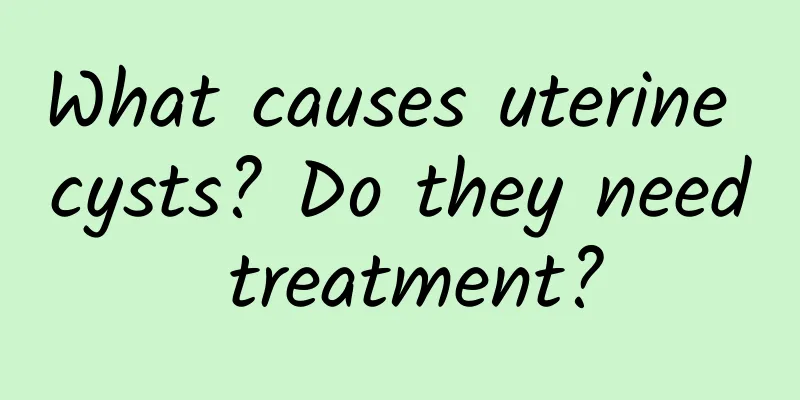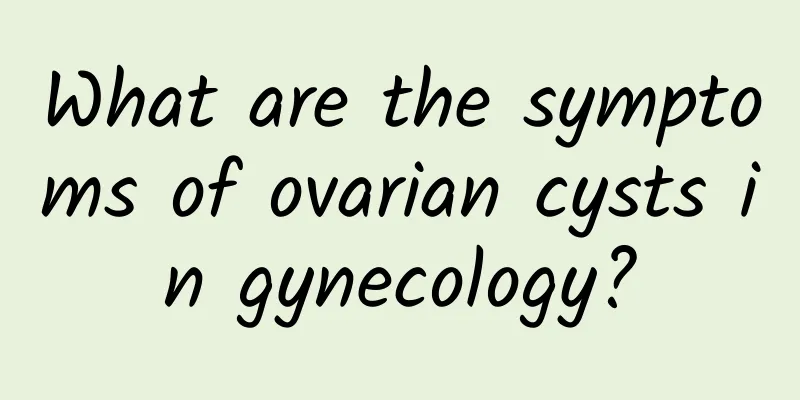What causes uterine cysts? Do they need treatment?

|
The formation of uterine cysts is mostly related to factors such as hormone imbalance, inflammatory infection and tissue lesions. Whether treatment is needed depends on the type of cyst and the severity of the symptoms. Mild cysts can be observed regularly, while more severe ones require drug treatment or surgical intervention. 1. Genetic factors Some women may have abnormal hormone secretion due to family inheritance, which increases the risk of cysts. In this case, regular gynecological examinations are necessary, especially for those with a family history of the disease. Regular monitoring can detect potential problems in time, thereby preventing cysts from expanding or becoming diseased. 2 Environmental factors External factors Pathogenic factors in the living environment, such as long-term exposure to chemicals, bad work and rest habits, and unbalanced diet, may induce hormonal disorders in the body, which in turn cause cysts. Not paying attention to the cleanliness of the reproductive organs or frequently using irritating cleaning products may lead to infection and worsen the condition. It is recommended to maintain a healthy lifestyle, avoid contact with harmful environments, and choose non-irritating cleaning products. 3. Physiological factors and personal factors Another major cause of cysts is an imbalance of estrogen and progesterone in women. This imbalance may be related to polycystic ovary syndrome or menstrual disorders. For such problems, it is recommended to supplement the necessary nutrients by adjusting the diet structure, such as consuming more foods rich in vitamins and phytoestrogens, and if necessary, hormone regulation therapy can be used under the guidance of a doctor. 4. Trauma or surgery Multiple abortions, delivery surgeries, or endometrial manipulations may damage uterine tissue and induce cysts. Using an inappropriate intrauterine contraceptive ring may also cause long-term irritation and increase the risk of cyst formation. Avoiding unnecessary surgical procedures and choosing regular medical institutions are important ways to reduce the risk. 5 Pathological factors Caused by the disease itself Certain gynecological inflammations such as pelvic inflammatory disease, cervical erosion or hormone-related diseases such as endometriosis may further develop into cysts. For such cysts, drug treatment is usually required, such as antibiotics to treat infection or hormone drugs to regulate endocrine. If the cyst is too large or the drug is ineffective, surgical treatment may be considered, such as ovarian cyst removal or transvaginal cyst drainage. Treatment and recommendations Depending on the type of cyst and symptoms, appropriate treatment is given: Drug treatment: Commonly used anti-inflammatory drugs such as cephalosporin antibiotics to treat infection, or short-term hormone drugs to regulate hormone levels. Surgical treatment: More serious cases may require surgery, such as cystectomy or hysterectomy, but it depends on the severity of the condition. Lifestyle intervention: Adjust your diet, eat more fresh fruits and vegetables, avoid spicy and overly greasy foods, control your weight and do moderate exercise, such as yoga and brisk walking. If the uterine cyst is small and has no obvious symptoms, there is no need to rush to treat it, but regular observation and follow-up treatment instructions are required. If the cyst causes pain, irregular bleeding, or affects menstruation, you should see a doctor immediately to avoid delaying the condition. In terms of prevention, maintaining a healthy weight, regular physical examinations, avoiding unclean sex, and adequate nutrition are all important. |
<<: Urine bleeding in the elderly after menopause
Recommend
A Grade 3 boy weighed over 100 pounds and almost had a liver failure! Remember the code for healthy postures: "85210"
The problem of obesity in children or adolescents...
What is the reason for less menstrual flow?
The decrease in menstrual flow is due to the decl...
What are the symptoms of left ovarian cyst?
Ovarian cysts are a common gynecological disease ...
Does exercising on an empty stomach help burn fat? Don't try these two types of people...
Does exercising on an empty stomach help burn fat...
Irregular menstruation may be caused by drug abuse
There are many reasons for irregular menstruation...
What should menopausal women pay attention to?
There are many things to pay attention to during ...
Ovarian cyst surgery should be carefully considered
Generally speaking, conservative treatment is use...
Experts introduce the examination methods of vaginitis
Vaginitis is a common gynecological inflammation,...
Symptoms of clinical cervicitis in the early stages
The key to controlling the harm of cervicitis is ...
What is the best medicine for female cervical erosion? Principles of drug treatment for female cervical erosion
Cervical erosion is a gynecological disease that ...
What kind of health products can patients with uterine fibroids take? Can patients with uterine fibroids take health care medicines?
Uterine fibroids are a common gynecological disea...
Experts reveal the cause of recurrent vaginitis
Women who have suffered from vaginitis know that ...
Go to the gym every day to lose weight? What are the benefits of intermittent exercise? How to create a six-pack and a perky butt?
In order to lose weight, some people go to the gy...
Female stars’ secret ways to lose weight! Jogging is a great way to burn fat
Marathon road running events have become popular ...
How can women prevent endometrial thickening?
Thick endometrium is a common disease among women...









